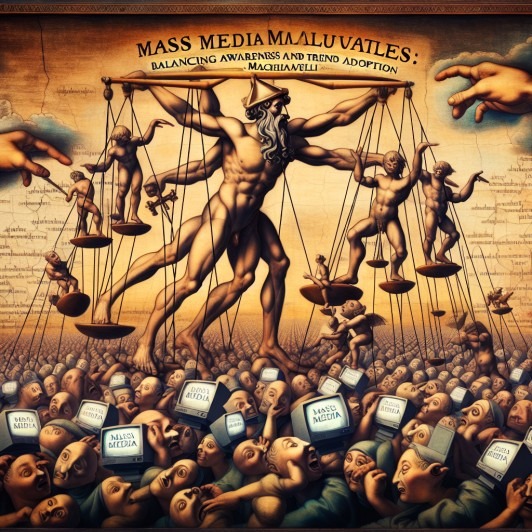
Mass Media: The Puppeteer of Everything
Updated July 9, 2024
“The press is a gang of cruel faggots. Journalism is not a profession or a trade. It is a cheap catch-all for fuckoffs and misfits—a false doorway to the backside of life, a filthy piss-ridden little hole nailed off by the building inspector, but just deep enough for a wino to curl up from the sidewalk and masturbate like a chimp in a zoo-cage.”
Amid the chaos – wars, soaring budget deficits, inflation, experts predicting a meltdown in equity and commodities, and a housing market teetering on the brink of collapse – we thought it apt to offer some light-hearted musings. At the very least, we hope to elicit a chuckle, if not outright laughter, from our readers.
Consider this: without thought, there is no thinker. It is the thought that creates the thinker.
And here’s a curious phrase we often use: “I am going to do this from the bottom of my heart.” Why not from the top of our hearts? Could we be holding back, giving less than our all, hence we say we’re doing it from the bottom?
The Pursuit of Perfection?
For a man to achieve perfection, two essential qualities must be cultivated in harmony: compassion and wisdom. Compassion embodies love, charity, kindness, tolerance, and other heart attributes. Wisdom, on the other hand, represents the intellectual faculties of the mind, such as logic and rationality. Both qualities are crucial for development; focusing on one at the expense of the other can lead to imbalance, a misguided sense of knowledge, or self-satisfaction. Overemphasizing emotional development can result in a well-intentioned fool, while overemphasising intellectual development can create a cold, unfeeling intellect. To attain perfection, one must strive to develop both qualities equally.
Mass Media Manipulates: The Perspective Shift
Consider the phrase “circle of friends” we often use rather than “line of friends”. What does being at the centre of a circle imply? It suggests a form of closure, a barrier against the outside world. Thus, when we talk about our “circle of friends”, we’re essentially saying that we’re closing ourselves off from new experiences. This concept can be extended to the markets and the advisors we follow. We tend to associate with those who share our beliefs; worse, we pay advisors who echo what we want to hear. If they dare to deviate, we react angrily and contemplate severing ties.
Have you ever wondered why we look down when ashamed or belittled? Sure, we aim to avoid eye contact because we feel inferior, but why not look up and beyond those trying to diminish us?
When we decide to marry, we use the term “settle down.” But why “down”? Why not “settle up”? Shouldn’t we be better off when we unite? If the angle of observation is manipulated, it can significantly alter a person’s perspective.
Mass Media Manipulates: The Illusion of Free Will in the Digital Age
In our hyper-connected world, we pride ourselves on making independent choices. We believe our thoughts, desires, and actions are products of our free will. But what if this cherished notion of autonomy is an elaborate illusion, carefully constructed and maintained by the mass media and tech giants that dominate our digital landscape?
Consider the pervasive influence of algorithms that shape our online experiences. These complex mathematical formulas don’t just predict our behaviours; they actively mould them. Every click, scroll, and lingering glance at a piece of content is meticulously recorded and analyzed. The result? a digital echo chamber tailored to each individual, reinforcing existing beliefs and gently nudging us toward predetermined outcomes.
But the manipulation goes deeper than mere content curation. Social media platforms have become virtual Skinner boxes, conditioning us with likes, shares, and notifications. We’ve become Pavlovian in our responses, chasing the dopamine hit of digital validation. Is this behaviour truly of our own volition, or are we simply well-trained subjects in a global psychological experiment?
The implications extend far beyond our social media habits. Political campaigns now leverage big data and micro-targeting to sway voters. News outlets use AI-driven headline optimization to capture our attention. E-commerce sites employ sophisticated pricing algorithms that know our willingness to pay better than we do ourselves. How can we be sure that our decisions are indeed our own in this environment?
Moreover, the lines between reality and digital manipulation are blurring alarmingly. Deepfake technology can create convincing videos of events that never occurred. AI-generated text is becoming indistinguishable from human writing. How can we trust our perceptions in a world where seeing is no longer believing?
This digital determinism raises profound questions about the nature of consciousness and identity. If external forces so easily influence our thoughts and actions, what does it mean to be an individual? Are we merely the sum of our data points, preferences, and behaviours predictable and malleable?
The counterargument, of course, is that awareness of these manipulations is the first step towards reclaiming our autonomy. By understanding the mechanisms at play, we can make more informed choices about digital consumption and interactions. But is this awareness itself just another layer of the illusion, a false sense of control granted to us by the very systems that seek to influence us?
We must grapple with these uncomfortable questions as we navigate this brave new world. The notion that our free will might be compromised by the technologies we’ve embraced for convenience and connection is unsettling. It challenges us to reevaluate our relationship with media, technology, and ourselves.
In the end, perhaps the most radical act of free will is questioning whether we possess it. By doing so, we may open the door to a deeper understanding of our place in this increasingly digital world and, potentially, to new forms of genuine autonomy that transcend the manipulations of mass media and big tech.
Mass Media Manipulates: The Misconception of Teamwork
From a young age, we’re inundated with the idea of working for the group’s benefit and being a team player. But let’s scrutinize this concept. If you’re constantly prioritizing the group’s interests over your own, how can you truly understand what’s beneficial if you’re oblivious to your needs?
Shouldn’t we identify our self-interests and understand what’s good for us? Only then can we possibly begin to consider the group’s interests. The current system is inherently flawed because those who are supposed to advocate for our interests are often unaware of their own. The inevitable outcome is a catastrophe. And if you take a moment to observe, do you see genuine teamwork in action?
Mass Media manipulates Perceptions.
Relationship: A Voyage of Two
The operative word here is ‘ship’, and as is commonly known, a ship can only have one captain. If there are more, it’s destined to sink sooner or later. This principle holds true for any relationship as well. When two individuals attempt to share power, it often results in chaos, which is why many relationships (particularly marriages) tend to hit the rocks.
I think I understand, or I Believe I Understand
Often, people use this phrase to suggest that they have a reasonable understanding of a particular topic. However, it’s a paradox – you can’t simultaneously think about and know something.
If you know something, there’s no need to think about it, and if you’re thinking about it, you can’t honestly know it – in other words, you’re not entirely sure.
So, when someone uses this phrase, what they might be implying is, “I’m just as confused as you are and have no idea what I’m supposed to be doing or saying.”
United, we stated, and divided, we fall.
Not if you break away in advance and let all the losers fall down by themselves. Mass psychology is about spotting the weak links and moving away just before those links snap or, on the flip side, spotting the weak links and taking a position before they suddenly strengthen.
A stitch in time could save nine.
That is true, provided it was put in the right place; otherwise, it could result in 20.
An ounce of prevention is worth a pound of cure.
Provided you have not mistaken poison for the cure, then the concept of cure is out the window, and all that comes to mind is funeral arrangements.
A bird in the hand is worth two in the bush
Well, that depends on whether it’s alive or dead.
A penny saved is a penny earned
Not when you take inflation into consideration
The older I grow the more I distrust the familiar doctrine that age brings wisdom.
Henry L. Mencken
Words that Resonate: Memorable Articles












